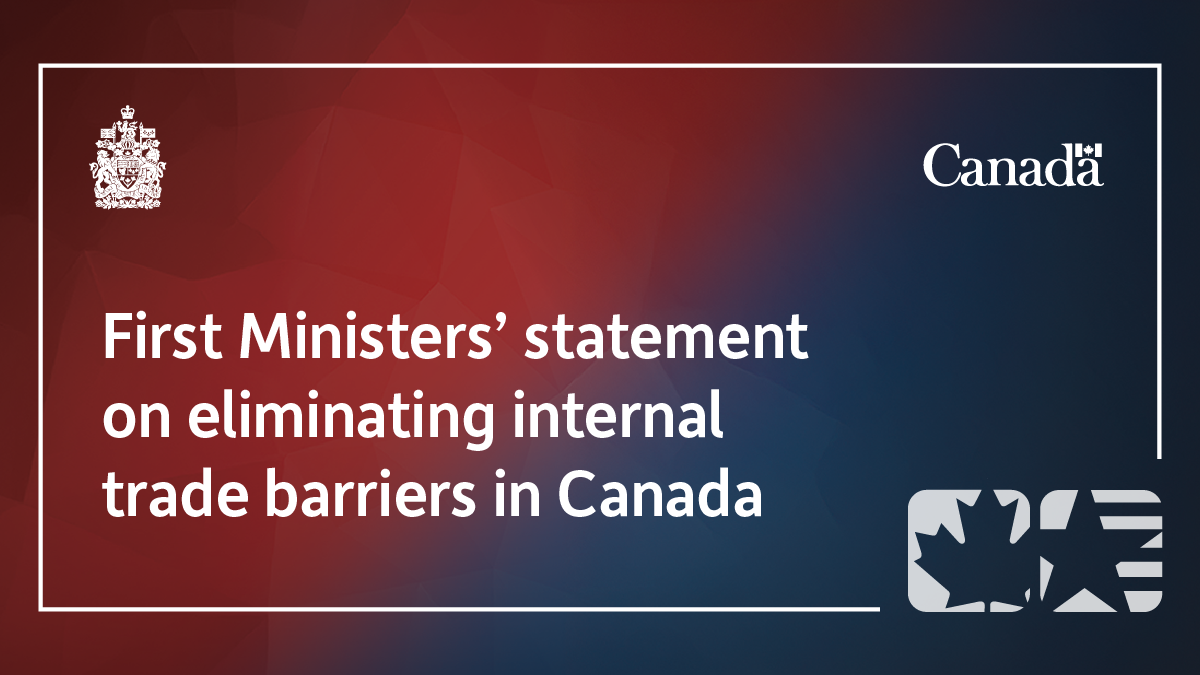“In the face of the United States’ unjustified decision to impose tariffs on Canadian goods, Canada’s First Ministers recognize this is a pivotal moment for Canada to take bold and united action. We must increase our economic resilience, reduce dependence on one market, and strengthen our domestic economy for the benefit of Canadian workers and businesses now and in the future. One key step is to make it easier for Canadians to do business with each other from coast to coast to coast.
“At their meeting yesterday, the Prime Minister and Canada’s premiers agreed to build on the foundational work of the Committee on Internal Trade and strengthen Canada’s domestic economy by reducing barriers to internal trade and labour mobility across the country. All First Ministers agreed that now is the time to take meaningful action to further liberalize and support the Canadian market so that goods, services, and workers can move freely.
“First Ministers agreed that certified professionals with credentials in one jurisdiction should be able to work anywhere in Canada. Whether relocating for family reasons or pursuing job opportunities elsewhere, workers should be free to do what they are trained to do and contribute to the Canadian economy. Due to its linguistic specificity among other things, Quebec, while adhering to the overall goal of increasing workforce mobility, intends to implement measures for credentials recognition when it deems it in line with its own objectives.
“The Prime Minister and premiers directed the Committee on Internal Trade to work with the Forum of Labour Market Ministers, to develop a service standard of 30 days or better to get people working faster, and provide a plan for Canada-wide credential recognition, while taking into account jurisdictional specificities such as language provisions, by June 1, 2025.
“First Ministers also agreed that now is the time to choose Canada. We must ensure that all Canadians have access to Canadian-made goods, no matter where they are in the country. The Prime Minister and premiers applauded Internal Trade Ministers for undertaking a review of exceptions under the Canadian Free Trade Agreement by June 1, 2025, in addition to those removed by governments in recent years, and for their efforts to reconcile and reduce regulatory differences between jurisdictions, particularly through the negotiation of mutual recognition requirements in the trucking sector and the movement of consumer goods. Most First Ministers also committed to allowing direct-to-consumer alcohol sales for Canadian products. These efforts will benefit Canadian businesses and citizens by opening new domestic markets, reducing the cost of consumer goods at a time when U.S. tariffs will impact affordability.
“First Ministers recognized that removing these barriers will make it easier for businesses in Canada to access new revenue and market opportunities here at home, while attracting greater foreign investment and trade.
“The Prime Minister and the premiers agreed to continue working together as they implement the shared plan to strengthen internal trade in Canada. Team Canada stands firm, united, resolute, and ready to face this challenge, and any others that come our way.”
his agenda not trade imballance / fentinal, border crap, that is just the excuse to act on these tariffs, breaking the trade agreements he negotiated during his first term....meanwhile everyone gets Fu**ed except the 1 %...my 2 cents....




